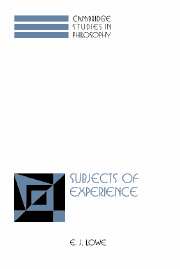6 - Language, thought and imagination
Published online by Cambridge University Press: 22 October 2009
Summary
Our abilities to perceive and act are clearly ones which we share with at least some of the animals, even if they possess them in less sophisticated forms than we do. But our higher cognitive capacities – for language, speculative thought and reflexive self-knowledge – may very well be exclusive to ourselves. Even so, I believe these higher capacities to be intimately related to our abilities to perceive and act, in many ways being extensions of those abilities. In this chapter I shall examine the relationship between our capacities for language and thought and our capacity for sense-perception, which I consider to be mediated by our powers of imagination – a view which I share with John Locke but not, I think, with many modern philosophers of mind.
If there is one theory of language which almost all modern philosophers have been united in repudiating, usually with contempt, it is the ideational theory – in essence, Locke's theory. The fundamental theses of the theory are these: (1) that the primary end of language is the communication of thought, (2) that thinking at its most basic consists in ‘having ideas’ – that is, is fundamentally imaginative in nature – and (3) that words acquire their power to express thoughts by being made, through custom and convention, to represent or signify ‘ideas’ in the minds of those who use them. I think it would be correct to say that the current philosophical opposition to this theory stems ultimately from the work of Frege and Wittgenstein – from the former's quite general hostility to ‘psychologism’ in semantics and logical theory and from the latter's rejection of appeals to ‘inner’ or ‘private’ mental processes in the explanation of linguistic behaviour.
- Type
- Chapter
- Information
- Subjects of Experience , pp. 162 - 181Publisher: Cambridge University PressPrint publication year: 1996



